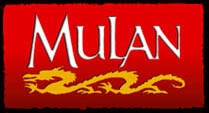
Cast * Production Details * Earlier Version * Interesting Facts * Mulan's Poem

Cast * Production Details * Earlier Version * Interesting Facts * Mulan's Poem
Directed by: Tony Bancroft & Barry Cook
Written by: Robert D. San Souci, based on an anonymous
poem
Music by: Jerry Goldsmith, Matthew Wilder & Vanessa-Mae
Nicholson
Released on: June 19, 1998
Running Time: 88 minutes
Budget: $70 million
U.S. Opening Weekend: $22.745 million over 2,888 screens
Box-Office: $121 million in the U.S., $303.5 million worldwide
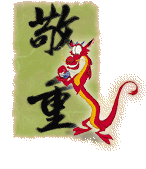 Fa
Mulan/Fa Ping... Ming Na-Wen & Lea Salonga (singing)
Fa
Mulan/Fa Ping... Ming Na-Wen & Lea Salonga (singing)
Captain Li Shang... B.D. Wong & Donny Osmond (singing)
Mushu... Eddie Murphy
Yao... Harvey Fierstein
Emperor... Pat Morita
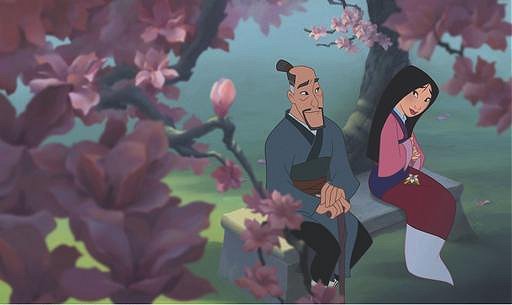 |
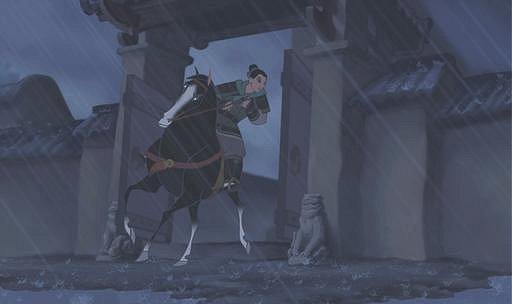 |
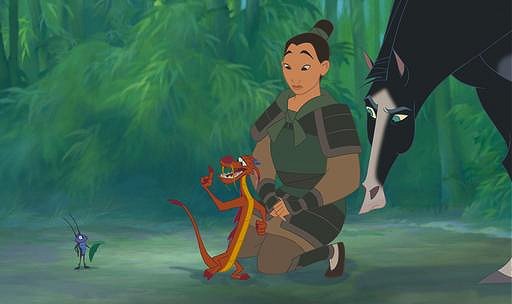 |
![]() Mulan is the
first feature length production which was created by Walt Disney Feature
Animation, Florida which is located at Disney/MGM Studios at Waft Disney
World.
Mulan is the
first feature length production which was created by Walt Disney Feature
Animation, Florida which is located at Disney/MGM Studios at Waft Disney
World.
![]() Mulan's artistic
leaders spent over three weeks in China drawing and photographing to learn
Chinese style and culture.
Mulan's artistic
leaders spent over three weeks in China drawing and photographing to learn
Chinese style and culture.
![]() The artistic
approach to the film is based upon the Chinese "sing" style of "negative,"
or empty-space balanced by positive detail.
The artistic
approach to the film is based upon the Chinese "sing" style of "negative,"
or empty-space balanced by positive detail.
![]() Computer animators
used the latest technology to add detail and to mimic camera techniques
that were previously unavailable to animators. A computer program called
Attila was used to create the sequence of 2,000 Huns on horseback and cround
scenes of 30,000 people.
Computer animators
used the latest technology to add detail and to mimic camera techniques
that were previously unavailable to animators. A computer program called
Attila was used to create the sequence of 2,000 Huns on horseback and cround
scenes of 30,000 people.
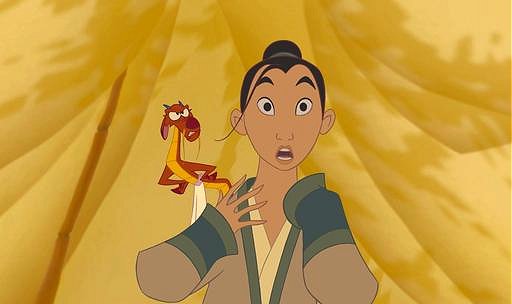 |
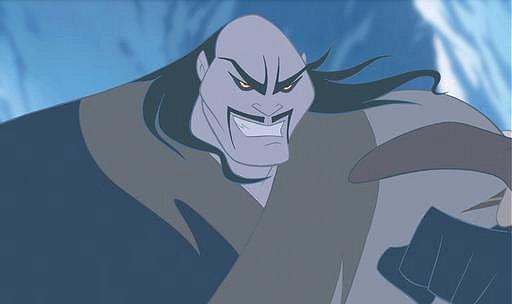 |
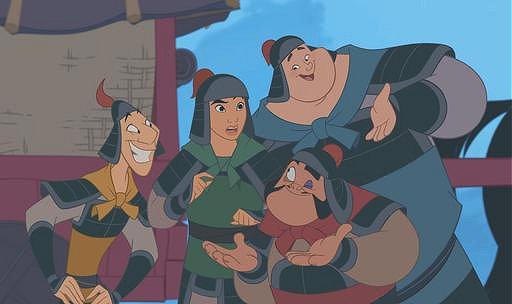 |
![]() At one point there
was a puppet show narration at the opening of the film, somewhat similar
to the opening of Disney's The
Hunchback of Notre Dame. A finished still from this is pictured
in The Art of Mulan book.
At one point there
was a puppet show narration at the opening of the film, somewhat similar
to the opening of Disney's The
Hunchback of Notre Dame. A finished still from this is pictured
in The Art of Mulan book.
![]() In an early version
of the story, Mulan and Shang are engaged at the very beginning. In some
drafts they have never met before they join the army; in other versions
Mulan had met him but didn't like him.
In an early version
of the story, Mulan and Shang are engaged at the very beginning. In some
drafts they have never met before they join the army; in other versions
Mulan had met him but didn't like him.
![]() Grandmother Fa
originally had a bigger role in the movie, but her part was cut back when
it felt to be too cutesy and distracting.
Grandmother Fa
originally had a bigger role in the movie, but her part was cut back when
it felt to be too cutesy and distracting.

![]() Originally there was a sidekick panda named (really) Moo Goo Gai Panda.
This idea was quickly replaced with two sidekick dragons named Yin and
Yang, who in turn were ultimately replaced by Mushu. "Moo Goo" survives
in a different form as the panda who eats Chi Fu's slipper.
Originally there was a sidekick panda named (really) Moo Goo Gai Panda.
This idea was quickly replaced with two sidekick dragons named Yin and
Yang, who in turn were ultimately replaced by Mushu. "Moo Goo" survives
in a different form as the panda who eats Chi Fu's slipper.
![]() At least two songs
by Stephen Schwartz were cut from the movie. One was called "Destiny" and
felt to be too angry for the character of Mulan. The other was written
for the transformation sequence and dropped when the storyboards worked
better without any dialogue or song lyrics.
At least two songs
by Stephen Schwartz were cut from the movie. One was called "Destiny" and
felt to be too angry for the character of Mulan. The other was written
for the transformation sequence and dropped when the storyboards worked
better without any dialogue or song lyrics.
![]() An alternate ending
showed Shang and Mulan riding off into the sunset on separate horses.
An alternate ending
showed Shang and Mulan riding off into the sunset on separate horses.
![]() Tentative titles
before the final Mulan, were China Doll,
Fa Mulan,
The
Legend of Fa Mulan and The Legend of
Tentative titles
before the final Mulan, were China Doll,
Fa Mulan,
The
Legend of Fa Mulan and The Legend of
Mulan.
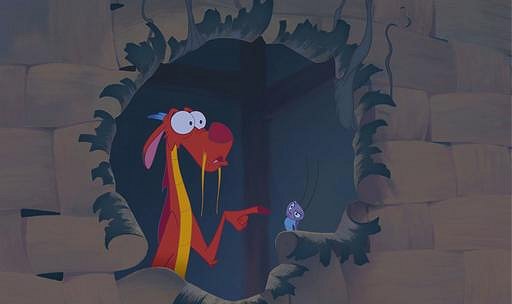 |
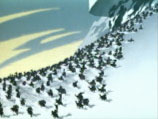 |
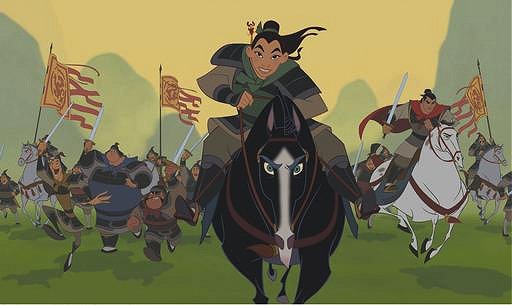 |
![]() Mulan means magnolia:
"Mu" by itself means "wood" and "Lan" means "orchid".
Mulan means magnolia:
"Mu" by itself means "wood" and "Lan" means "orchid".
![]() The story
of Mulan has been told in China for almost 2,000 years. Mulan
is the heroine of a famous Chinese poem written during the Northern Dynasties
(AD 420-589). In the story, Mulan disguises herself as a man to serve in
the army in her father's place. While serving, she is recognized as a courageous
soldier and offered a government post. She turns down the position in favor
of going home and living a peaceful life with her family. After she returns
home, she puts back on her lady's clothes--and shocks her fellow soldiers,
who didn't know she was a woman during all that time on the battlefield.
The story was expanded into a novel during the late Ming (AD 1368-1644)
Dynasty.
The story
of Mulan has been told in China for almost 2,000 years. Mulan
is the heroine of a famous Chinese poem written during the Northern Dynasties
(AD 420-589). In the story, Mulan disguises herself as a man to serve in
the army in her father's place. While serving, she is recognized as a courageous
soldier and offered a government post. She turns down the position in favor
of going home and living a peaceful life with her family. After she returns
home, she puts back on her lady's clothes--and shocks her fellow soldiers,
who didn't know she was a woman during all that time on the battlefield.
The story was expanded into a novel during the late Ming (AD 1368-1644)
Dynasty.
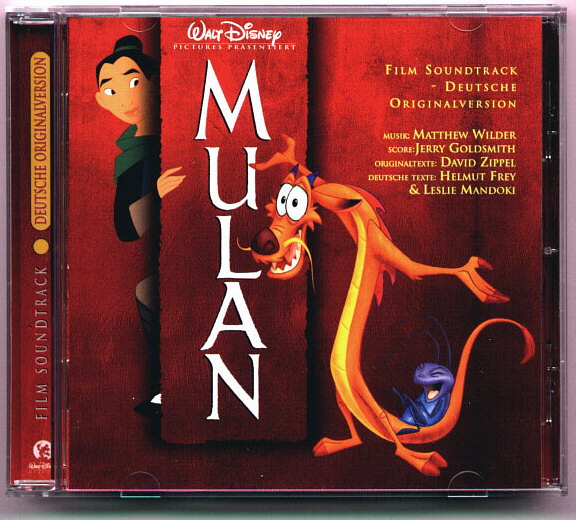
![]() When the ancestors first discuss which gardian to send to help Mulan, the
top shelf has several stone sculptures of the guardians, one of the sculptures
is Hugo from The Hunchback of
Notre Dame.
When the ancestors first discuss which gardian to send to help Mulan, the
top shelf has several stone sculptures of the guardians, one of the sculptures
is Hugo from The Hunchback of
Notre Dame.
![]() When Mulan sings
"Reflection" in her father's shrine, her reflection appears in the polished
surface of the temple stones. The writing on the temple stones is the names
of the Disney animators who worked on the film written in ancient Chinese.
When Mulan sings
"Reflection" in her father's shrine, her reflection appears in the polished
surface of the temple stones. The writing on the temple stones is the names
of the Disney animators who worked on the film written in ancient Chinese.
![]() B.D. Wong (Shang)
was Franc's assistant in the Father of the Bride remakes.
B.D. Wong (Shang)
was Franc's assistant in the Father of the Bride remakes.
![]() The music -at
least at the end- of the theater and video trailer is originally from the
film Dragonheart, scored by Randy Edelman.
The music -at
least at the end- of the theater and video trailer is originally from the
film Dragonheart, scored by Randy Edelman.
![]() Disney's Florida
story artists had originally envisioned an opening scene where all of the
incidents that lead up to the creation of the Great Wall of China are played
out by shadow puppets performing by candle light behind a paper screen,
according to Jim Hill. Eventually,
the camera would have pulled back away from the paper screen, revealing
that there was an audience seated in a puppet theater that was watching
this shadow play. The camera would then have drifted over to the theater's
window and revealed that -- just as the off-screen puppeteer is explaining
how the Great Wall prevented the Mongol horde from ever returning and attacking
China -- that Shan Yu and his army are (at that very same moment) swarming
over the Wall. The sequence was supposed to have ended with the horde entering
the theater in the middle of the puppet show. The audiences flees, screaming.
Shan Yu kills the puppeteer and then sets fire to the shadow puppets and
the paper screen.
Disney's Florida
story artists had originally envisioned an opening scene where all of the
incidents that lead up to the creation of the Great Wall of China are played
out by shadow puppets performing by candle light behind a paper screen,
according to Jim Hill. Eventually,
the camera would have pulled back away from the paper screen, revealing
that there was an audience seated in a puppet theater that was watching
this shadow play. The camera would then have drifted over to the theater's
window and revealed that -- just as the off-screen puppeteer is explaining
how the Great Wall prevented the Mongol horde from ever returning and attacking
China -- that Shan Yu and his army are (at that very same moment) swarming
over the Wall. The sequence was supposed to have ended with the horde entering
the theater in the middle of the puppet show. The audiences flees, screaming.
Shan Yu kills the puppeteer and then sets fire to the shadow puppets and
the paper screen.
![]() Astonishingly,
the British censors would not issue the film with a U certificate until
2 seconds of footage showing a headbutt had been removed!
Astonishingly,
the British censors would not issue the film with a U certificate until
2 seconds of footage showing a headbutt had been removed!
![]() Pocahontas
and The Hunchback of Notre Dame lyricist Stephen Schwartz was originally
signed to write songs for Mulan. He submitted two or three songs,
including an opening song called "Destiny". Stephen commented: "In addition
to "Destiny", which was to have been the opening number, I wrote two other
songs for Mulan, both of which had been accepted by Disney before
I was replaced on the film. One was called "Written in Stone", which essentially
was replaced by "Mulan's Reflection" and was one of my favorite songs I
have ever written an animated feature. The other was "China Doll", and
was similar to the song now in the film in which Mulan is dressed and prettied
in preparation for meeting her betrothed ["Honor To Us All"]."
Pocahontas
and The Hunchback of Notre Dame lyricist Stephen Schwartz was originally
signed to write songs for Mulan. He submitted two or three songs,
including an opening song called "Destiny". Stephen commented: "In addition
to "Destiny", which was to have been the opening number, I wrote two other
songs for Mulan, both of which had been accepted by Disney before
I was replaced on the film. One was called "Written in Stone", which essentially
was replaced by "Mulan's Reflection" and was one of my favorite songs I
have ever written an animated feature. The other was "China Doll", and
was similar to the song now in the film in which Mulan is dressed and prettied
in preparation for meeting her betrothed ["Honor To Us All"]."
![]() While promoting
Lilo
& Stitch, actress and singer Tia Carrere explained that "the
question of a Disney animated feature had come up previously. The casting
director was looking for me for Mulan, and for some reason I was
working in Eastern Europe, and my agent at the time kinda dropped the ball,
and I was really upset about it because I wanted to be a part of the Disney
history. So I was really disappointed."
While promoting
Lilo
& Stitch, actress and singer Tia Carrere explained that "the
question of a Disney animated feature had come up previously. The casting
director was looking for me for Mulan, and for some reason I was
working in Eastern Europe, and my agent at the time kinda dropped the ball,
and I was really upset about it because I wanted to be a part of the Disney
history. So I was really disappointed."
![]() In 1998, after
completing demo in hopes of landing a record deal, Christina Aguilera auditioned
to sing "Reflection." According to Christina, "They needed someone who
could hit a high E above middle C." Christina then cut a one-take demo
in her living room singing to a karaoke tape of Whitney Houston's "I Wanna
Run To You." The demo was rushed to Disney, and within a day, Christina
was in a Los Angeles studio recording "Reflection." That same week, RCA
Records signed her to a record contract.
In 1998, after
completing demo in hopes of landing a record deal, Christina Aguilera auditioned
to sing "Reflection." According to Christina, "They needed someone who
could hit a high E above middle C." Christina then cut a one-take demo
in her living room singing to a karaoke tape of Whitney Houston's "I Wanna
Run To You." The demo was rushed to Disney, and within a day, Christina
was in a Los Angeles studio recording "Reflection." That same week, RCA
Records signed her to a record contract.
![]() Disney won permission
to show Mulan in China in 1999. The film reportedly flopped there
because the main character looked and behaved differently from the Hua
Mulan figure portrayed in Chinese poems and folklore.
Disney won permission
to show Mulan in China in 1999. The film reportedly flopped there
because the main character looked and behaved differently from the Hua
Mulan figure portrayed in Chinese poems and folklore.
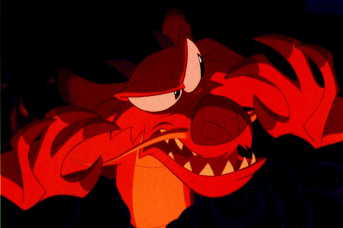 |
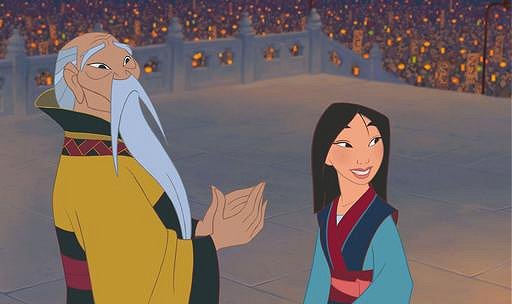 |
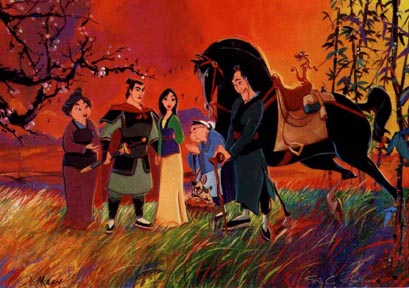 |
![]() Anonymous
from the 5th or 6th century A.D. Translation from
The Flowering
Plum and The Palace Lady: Interpretations of Chinese Poetry
by Hans H. Frankel.
Anonymous
from the 5th or 6th century A.D. Translation from
The Flowering
Plum and The Palace Lady: Interpretations of Chinese Poetry
by Hans H. Frankel.
Tsiek tsiek and again tsiek tsiek,
Mu-lan weaves, facing the door.
You don't hear the shuttle's sound,
You only hear Daughter's sighs.
They ask Daughter who's in her heart,
They ask Daughter who's on her mind.
"No one is in Daughter's heart,
No one is on Daughter's mind.
Last night I saw the draft posters,
The Khan is calling many troops,
The army list is in twelve scrolls,
On every scroll there's Father's name.
Father has no grown-up son,
Mu-lan has no elder brother.
I want to buy a saddle and a horse,
And serve in the army in Father's place."
In the East Market she buys a spirited horse,
In the West Market she buys a saddle,
In the South Market she buys a bridle,
In the North Market she buys a long whip.
At dawn she takes leave of Father and Mother,
In the evening camps on the Yellow River's bank.
She doesn't hear the sound of Father and Mother calling,
She only hear the Yellow River's flowing water cry tsien tsien.
At dawn she takes leave of the Yellow River,
In the evening she arrives at Black Mountain.
She doesn't hear the sound of Father and Mother calling,
She only hears Mount Yen's nomad horses cry tsiu tsiu.
She goes ten thousand miles on the business of war,
She crosses passes and mountains like flying.
Northern gusts carry the rattle of army pots,
Chilly light shines on iron armor.
Generals die in a hundred battles,
Stout soldiers return after ten years.
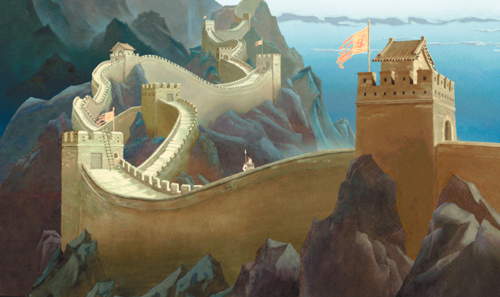 On
her return she sees the Son of Heaven,
On
her return she sees the Son of Heaven,
The Son of Heaven sits in the Splendid Hall.
He gives out promotions in twelve ranks
And prizes of a hundred thousand and more.
The Khan asks her what she desires.
"Mu-lan has no use for a minister's post.
I wish to ride a swift mount
To take me back to my home."
When Father and Mother hear Daughter is coming
They go outside the wall to meet her, leaning on each other.
When Elder Sister hears Younger Sister is coming
She fixes her rouge, facing the door.
When Little Brother hears Elder Sister is coming
He whets the knife, quick quick, for pig and sheep.
"I open the door to my east chamber,
I sit on my couch in the west room,
I take off my wartime gown
And put on my old-time clothes."
Facing the window she fixes her cloudlike hair,
Hanging up a mirror she dabs on yellow flower-powder.
She goes out the door and sees her comrades.
Her comrades are all amazed and perplexed.
Traveling together for twelve years
They didn't know Mu-lan was a girl.
"The he-hare's feet go hop and skip,
The she-hare's eyes are muddled and fuddled.
Two hares running side by side close to the ground,
How can they tell if I am he or she?"
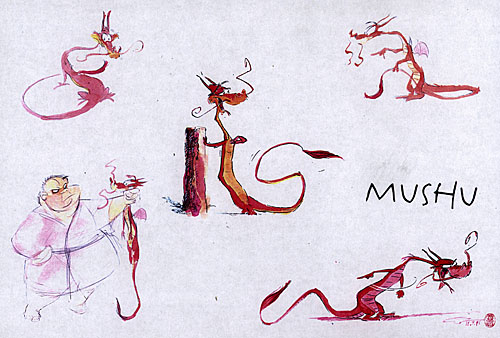 |
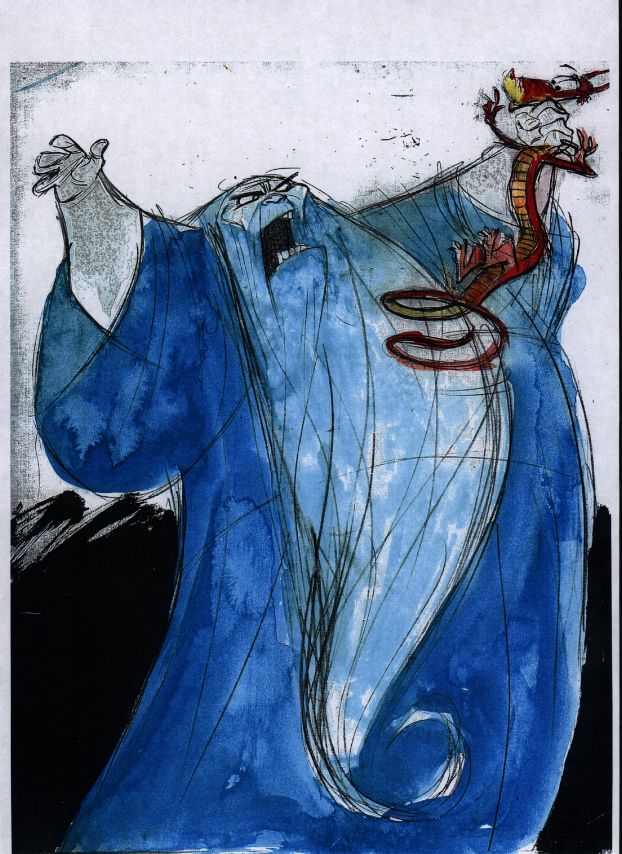 |
|
||||||||||||